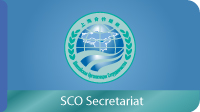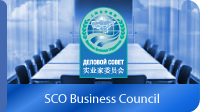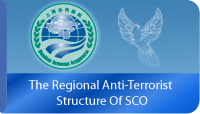|
|
 |
| Interview with the SCO Secretary-General “Multilateral cooperation in healthcare and sanitary and epidemiological well-being in the SCO countries is m |
| 13.05.2020 13:48 |
|
|
|
|
Question: Mr Norov, what is the SCO doing to fight the coronavirus? How are the states coordinating their efforts during this crisis?
Vladimir Norov: The coronavirus pandemic came as a major challenge for all of humanity and it has attacked the globalised world that has become interdependent in the economy and politics, caused a financial and economic crisis and exposed healthcare and social welfare deficiencies around the world.
It's ironic, but even developed countries and major regional unions and alliances were unprepared to deal with this threat.
Initially, COVID-19 spread across China which is a leading global economy and a global manufacturing centre. Notably, the Chinese authorities and people should be praised for overcoming the epidemic and progressing past the peak in early March. The sheer scope of the epidemic in China has determined the need for taking preventive measures in the SCO countries.
Basically, when the virus came to other SCO countries, the people already had a general idea about the threat posed by the disease and were receptive to the restrictions that had to be imposed. Many SCO member states have introduced emergency regulations. Special government commissions and operational headquarters have been established to control and prevent the spread of COVID-19 in accordance with WHO recommendations.
The SCO countries maintain close contact between the heads of state and heads of ministries and departments in charge of healthcare and epidemiological situation.
As you may know, the SCO member states provided assistance to the Chinese government and moral support for the Chinese people during the peak of the epidemic in China. China is currently providing assistance to the SCO countries by sending humanitarian supplies, doctors and specialists.
Uzbekistan has proactively provided assistance to Kyrgyzstan and Russia. Iran, Belarus and Afghanistan, which are SCO observer states, also received assistance from Uzbekistan. Kazakhstan said it was ready to help the Central Asian countries and has sent humanitarian aid to Tajikistan and Kyrgyzstan. China sent doctors and specialists to a number of SCO countries. All of that is indicative of the SCO countries' commitment to cooperate and support each other as they strive to jointly overcome this emergency.
In particular, Kyrgyzstan's public organisations said that President of Uzbekistan Shavkat Mirziyoyev who, in 2019, came up with the slogan, Central Asia is Our Common Home, "has, in fact, once again showed that the countries in the region are more than close neighbours, but also brothers. We must act shoulder to shoulder and help and support each other in the face of this common threat."
In its role as coordinator, the SCO Secretariat has come up with a number of proposals and initiatives to fight the coronavirus jointly. A video conference of experts from the ministries of healthcare of the SCO member states was held on April 1, 2020, during which the participants reviewed the epidemiological situation in the member states, discussed ways to promote cooperation and to identify an effective method for treating patients with a confirmed diagnosis.
We plan to continue consultations on fighting coronavirus at the higher levels. We are also working to create the Coordinating Council for Joint Countering of Epidemic Threats, within the SCO space.
Multilateral cooperation in healthcare and sanitary and epidemiological well-being in the SCO countries is more important now than ever before. Over the past years, the SCO member states have contributed to the successful fight against the outbreak of the Ebola and Zika fevers, made an effective contribution to eliminating measles and polio, and took measures to counteract the spread of viral hepatitis, HIV/AIDS and highly pathogenic flu with the potential to become a pandemic, as well as other diseases.
The situation with the coronavirus has shown that any outbreak of an infectious disease can become a global threat in a matter of days. This calls for stepped up practical cooperation between all global stakeholders.
With regard to existing SCO standards, there are a number of important documents and working mechanisms to ensure cooperation between the SCO member states in healthcare. In particular, there's a meeting of healthcare ministers and a meeting of heads of agencies of the SCO member states in charge of ensuring sanitary and epidemiological well-being.
Question: What is your opinion on China's experience in fighting the pandemic? Is it already being used in other SCO countries?
Vladimir Norov: From day one of the outbreak, the Chinese government came up with a package of decisive and goal-oriented measures. Comprehensive, tough and targeted actions made it possible to create an effective system for controlling, preventing and treating the disease. The measures aimed at early detection, early warning, early isolation and early treatment have brought positive results.
Amid the continued spread of the coronavirus pandemic, especially in Western Europe and the United States, China's achievements in countering the virus are becoming increasingly visible. Compared with the Western countries' belated response to this global threat, the Chinese government and people have shown a high level of organisation and the ability to quickly mobilise the country's capabilities to fight the common enemy. This is indicative of the country's enormous potential and a high level of public administration, which China made use of to tackle the national healthcare challenges.
It is particularly important that China offered a helping hand to other countries. To date, it has provided assistance to 127 countries and four international organisations, donated $50 million to the WHO and sent a total of 20 medical teams to combat the epidemic in 18 countries, thus making a major contribution to fighting the pandemic.
With regard to China's experience, admittedly, fighting the coronavirus made it take unprecedented steps, which include introducing a lockdown in cities with many millions of residents, stopping manufacturing altogether, cancelling all activities and using modern technology to treat the disease, to maintain public safety and to support remote employment. These measures helped curb the epidemic, and have been introduced to varying degrees in many countries, in particular, the SCO countries.
Question: What will the organisation do to lead the member countries' economies out of the crisis once the pandemic is over?
Vladimir Norov: According to the UN, the virus has affected the lives of 2.7 billion employed people, or 81 percent of the employed people around the world. The economic shock from the coronavirus pandemic cannot be avoided. According to expert estimates, the global GDP will be down anywhere from 6 percent to 15 percent this year. Much will depend on how long the pandemic will last and the quarantine measures taken by national governments.
Of course, the pandemic has caused significant damage to the global economy. The industrial output in China fell by 13.5 percent in annual terms in January-February. The success in fighting the coronavirus helped bring life in China back to normal. Clearly, the Chinese economy will resume growth in the second quarter of 2020.
However, China's successful economic recovery also depends on how quickly and successfully the global quarantine ends and consumer demand for Chinese-made goods gets back on track in the rest of the world. Currently, the SCO member states are drafting an Action Plan for 2021 ̶ 2025 for implementing the SCO Development Strategy aimed at enhancing trade and economic cooperation and leading the SCO economies out of the crisis after the pandemic is over.
Overall, the outlook for Eurasian economies is not that bad. Of course, the quarantine measures' pressure on the economy and, most importantly, the consumer demand, will be enormous and, according to the international institutions, the total global consumption may drop by 5 to 10 percent this year.
Real disposable incomes may shrink by 5 to 7 percent or more. The unemployment rate may go up to 6 ̶ 10 percent. In this regard, socially oriented measures are quite important, and I fully share the member state governments' focus on supporting aggregate demand, households and businesses. I hope our countries will be able to avoid significant inflationary risks in the medium term.
Question: Will the logistics map within the SCO space be upgraded in the wake of the pandemic?
Vladimir Norov: The logistics map is connected with the organisation's transport and transit capability. The SCO focuses particularly on promoting multilateral cooperation in transport and communications. The SCO Development Strategy Towards 2025, the Bishkek Declaration adopted in June 2019, as well as the SCO Member States Programme of Multilateral Trade and Economic Cooperation to 2035 approved in Tashkent in October 2019 emphasise the importance of deeper cooperation, including the modernisation of existing and creating new transport corridors, building multimodal logistics centres, creating an industrial cluster network along transport arteries, as well as using digital technologies and intellectual systems in transport.
The SCO member states strongly advocate the formation of the North-South and East-West international transport corridors as important transit routes for transporting goods along a shorter and less costly land route between Asia and Europe. After all, the usual way of delivering goods by sea from China to Europe takes about 45 days, and the SCO infrastructure will cut this time to 7 or 8 days.
Central Asian countries have adopted an active position with regard to expanding the SCO transcontinental motorway and railway routes. Due to their geographic location, access to the markets of Russia, China and Europe is an important link in economic activities of these states. In this regard, the project for building the China-Kyrgyzstan-Uzbekistan railway proposed by the leaders of Uzbekistan and Kyrgyzstan is quite aptly timed and could become a promising alternate route connecting China with the Middle East, Turkey and Europe. The project is designed to become an important link in the regional transport network of the East-West and North-South projects providing access to international seaports for the landlocked Central Asian countries.
Notably, over 13 million kilometres of motorways, or almost 20 percent of motorways worldwide, and 312,000 kilometres of railways have already been built in the SCO region. Rail freight transportation from China to Kazakhstan, Central Asian countries, Russia and Europe is on the rise. The volume of freight transportation by rail across two railway crossings on the Kazakhstan-China border amounted to about 14 million tonnes in 2018, up 38 percent.
Once economic activity resumes in the post-pandemic world, rail freight transportation is expected to exceed previous levels in 2021̶ 2022. To promote cooperation in this area, the SCO has adopted the Railway Authority (Railway) Interaction Concept. We plan to hold the second meeting of heads of railway authorities of the SCO member states in June. In general, the SCO transit potential has yet to be implemented. The full effect can only be expected following the completion of the above major projects.
Question: How did the pandemic affect the One Belt, One Road project?
Vladimir Norov: The latest data shows that the total volume of imports and exports between China and the countries located along the Belt and Road route exceeded $300 billion in the first quarter, an increase of 3.2 percent compared to the same period last year. In the same period, freight transportation between China and Europe reached 1,941 trains, up 15 percent year on year.
Currently, 125 states and 29 international and regional organisations are participating in the Belt and Road Initiative. Accordingly, it has taken on a global dimension, and it would be naive to believe that the pandemic will not affect the programmes and projects that are part of the Belt and Road Initiative, because the world is quarantined. However, I believe that the projects will be back on track already in the second half of 2020, which we can see, primarily, from the stepped up economic activity in China.
Question: Is it possible to create, under the auspices of the SCO, new venues that would unite countries in the post-pandemic world, such as a single online learning platform or a medical platform?
Vladimir Norov:- Modern means of communications and the latest information technology are making a sizable contribution to fighting the coronavirus. Information security and the security of critical infrastructure have become particularly important due to a greater media focus on the coronavirus, as well as the mass transition of people to online communication and telecommuting. I think the experience that has been gained in combatting the coronavirus nationally and internationally will lead to the creation of online platforms for training and exchanging experience in healthcare, including within the SCO.
The SCO Secretariat has come up with ideas for organising distance learning. In conjunction with Weidong, we are drafting a concept and a platform and will have it reviewed by the stakeholders in the near future. This platform will primarily be aimed at training students at medical universities in the SCO member states.
Question: What action needs to be taken by the SCO countries to prevent such crises in the future?
Vladimir Norov: First of all, it is imperative to improve the capabilities of the research-based forecasting and prevention of highly contagious diseases, to sum up the most valuable experiences for overcoming the coronavirus pandemic, to increase the effectiveness of the SCO mechanisms in responding promptly to future epidemics and pandemics, to update the legal framework for cooperation in healthcare and fighting epidemics, to create adequate stocks of medicines and equipment for emergency use within the SCO space, and to work out legal and organisational aspects of interaction with the WHO.
Of course, these steps call for making appropriate decisions regarding the allocation of funding and establishing corresponding foundations, and training researchers and epidemiologists.
Question: What's your take on the community of common destiny concept advanced by China's president?
Vladimir Norov: The Chinese president first advanced the idea of a community of common destiny of humankind in 2012. Subsequently, this concept was included in the resolutions adopted by the UN Commission for Social Development, the UN Security Council and the UN Human Rights Council. Thus, the concept of the community of common destiny was recognised by all UN members, a fact confirmed by its first inclusion in the UN Security Council resolution of 17 March, 2017. Subsequently, it was repeatedly included in other UN resolutions as well.
It was proposed to implement the concept in five iterations, namely, politics, security, economy, culture and the environment, thereby promoting the creation of a new global community model, based on lasting peace and universal security, common prosperity, openness and tolerance. Thus, humanity was given a new paradigm of progress where the world would be developing through peace. With the ever-expanding international cooperation, the community of common destiny concept is gaining popularity and support of the international community.
According to Chinese Foreign Minister Wang Yi, Chinese leader Xi Jinping "has come up with a Chinese project for the world to counter the global challenges faced by humanity, while turning the concepts generated by China into an international consensus."
I would like to note that, by its concept, the idea of a community of common destiny is close to the key principles underlying the SCO, namely, openness, non-directionality against other states or international organisations, the non-alignment nature of international association and consensus as a democratic way of making decisions.
Today, the sudden outbreak of the novel coronavirus pneumonia COVID-19 has spread to over 210 countries and regions with the number of infected people exceeding 3 million. Unfortunately, many people have become sick and increasingly more countries are declaring emergency situations. The international community is facing an unprecedented "dark time" when no country is immune to the virus, and no country can beat the outbreak on its own. This is yet another proof of the importance and relevance of building a community of common destiny.
Source: http://eng.sectsco.org/news/20200501/645350.html
|
|
* Реестр иностранных средств массовой информации, выполняющих функции иностранного агента:
Голос Америки, Idel.Реалии, Кавказ.Реалии, Крым.Реалии, Телеканал Настоящее Время, Azatliq Radiosi, PCE/PC, Сибирь.Реалии, Фактограф, Север.Реалии, Радио Свобода, MEDIUM-ORIENT, Пономарев Лев Александрович, Савицкая Людмила Алексеевна, Маркелов Сергей Евгеньевич, Камалягин Денис Николаевич, Апахончич Дарья Александровна, Medusa Project, Первое антикоррупционное СМИ, VTimes.io, Баданин Роман Сергеевич, Гликин Максим Александрович, Маняхин Петр Борисович, Ярош Юлия Петровна, Чуракова Ольга Владимировна, Железнова Мария Михайловна, Лукьянова Юлия Сергеевна, Маетная Елизавета Витальевна, The Insider SIA, Рубин Михаил Аркадьевич, Гройсман Софья Романовна, Рождественский Илья Дмитриевич, Апухтина Юлия Владимировна, Постернак Алексей Евгеньевич, Общество с ограниченной ответственностью Телеканал Дождь, Петров Степан Юрьевич, Istories fonds, Шмагун Олеся Валентиновна, Мароховская Алеся Алексеевна, Долинина Ирина Николаевна, Шлейнов Роман Юрьевич, Анин Роман Александрович, Великовский Дмитрий Александрович, Альтаир 2021, Ромашки монолит, Главный редактор 2021, Вега 2021
* Сведения реестра НКО, выполняющих функции иностранного агента:
Фонд защиты прав граждан Штаб, Институт права и публичной политики, Лаборатория социальных наук, Фонд по борьбе с коррупцией, Альянс врачей, НАСИЛИЮ.НЕТ, Мы против СПИДа, Фонд защиты прав граждан, СВЕЧА, Гуманитарное действие, Открытый Петербург, Феникс ПЛЮС, Лига Избирателей, Правовая инициатива, Гражданская инициатива против экологической преступности, Фонд борьбы с коррупцией, Гражданский Союз, Российский Красный Крест, Центр Хасдей Ерушалаим, Центр поддержки и содействия развитию средств массовой информации, Горячая Линия, В защиту прав заключенных, Институт глобализации и социальных движений, Центр социально-информационных инициатив Действие, ВМЕСТЕ, Благотворительный фонд охраны здоровья и защиты прав граждан, Благотворительный фонд помощи осужденным и их семьям, Фонд Тольятти, Новое время, Серебряная тайга, Так-Так-Так, центр Сова, центр Анна, Проект Апрель, Самарская губерния, Эра здоровья, правозащитное общество Мемориал, Аналитический Центр Юрия Левады, Издательство Парк Гагарина, Фонд имени Андрея Рылькова, Сфера, Центр защиты СИБАЛЬТ, Уральская правозащитная группа, Женщины Евразии, Рязанский Мемориал, Екатеринбургское общество МЕМОРИАЛ, Институт прав человека, Фонд защиты гласности, Российский исследовательский центр по правам человека, Дальневосточный центр развития гражданских инициатив и социального партнерства, Пермский региональный правозащитный центр, Гражданское действие, Центр независимых социологических исследований, Сутяжник, АКАДЕМИЯ ПО ПРАВАМ ЧЕЛОВЕКА, Частное учреждение Совета Министров северных стран, Центр развития некоммерческих организаций, Гражданское содействие, Центр Трансперенси Интернешнл-Р, Центр Защиты Прав Средств Массовой Информации, Институт развития прессы - Сибирь, Фонд поддержки свободы прессы, Гражданский контроль, Человек и Закон, Общественная комиссия по сохранению наследия академика Сахарова, Информационное агентство МЕМО. РУ, Институт региональной прессы, Институт Развития Свободы Информации, Экозащита!-Женсовет, Общественный вердикт, Евразийская антимонопольная ассоциация, Чанышева Лилия Айратовна, Сидорович Ольга Борисовна, Таранова Юлия Николаевна, Туровский Александр Алексеевич, Васильева Анастасия Евгеньевна, Ривина Анна Валерьевна, Бурдина Юлия Владимировна, Бойко Анатолий Николаевич, Гусева Ольга Андреевна, Дугин Сергей Георгиевич, Пивоваров Андрей Сергеевич, Писемский Евгений Александрович, Аверин Виталий Евгеньевич, Барахоев Магомед Бекханович, Шевченко Дмитрий Александрович, Жданов Иван Юрьевич, Рубанов Роман Викторович, Шарипков Олег Викторович, Мальсагов Муса Асланович, Мошель Ирина Ароновна, Шведов Григорий Сергеевич, Пономарев Лев Александрович, Каргалицкий Борис Юльевич, Созаев Валерий Валерьевич, Исакова Ирина Александровна, Исламов Тимур Рифгатович, Романова Ольга Евгеньевна, Щаров Сергей Алексадрович, Цирульников Борис Альбертович, Халидова Марина Владимировна, Людевиг Марина Зариевна, Федотова Галина Анатольевна, Паутов Юрий Анатольевич, Верховский Александр Маркович, Пислакова-Паркер Марина Петровна, Кочеткова Татьяна Владимировна, Чуркина Наталья Валерьевна, Акимова Татьяна Николаевна, Золотарева Екатерина Александровна, Рачинский Ян Збигневич, Жемкова Елена Борисовна, Гудков Лев Дмитриевич, Илларионова Юлия Юрьевна, Саранг Анна Васильевна, Захарова Светлана Сергеевна, Аверин Владимир Анатольевич, Щур Татьяна Михайловна, Щур Николай Алексеевич, Блинушов Андрей Юрьевич, Мосин Алексей Геннадьевич, Гефтер Валентин Михайлович, Симонов Алексей Кириллович, Флиге Ирина Анатольевна, Мельникова Валентина Дмитриевна, Вититинова Елена Владимировна, Баженова Светлана Куприяновна, Исаев Сергей Владимирович, Максимов Сергей Владимирович, Беляев Сергей Иванович, Голубева Елена Николаевна, Ганнушкина Светлана Алексеевна, Закс Елена Владимировна, Буртина Елена Юрьевна, Гендель Людмила Залмановна, Кокорина Екатерина Алексеевна, Шуманов Илья Вячеславович, Арапова Галина Юрьевна, Пастухова Анна Яковлевна, Прохоров Вадим Юрьевич, Шахова Елена Владимировна, Подузов Сергей Васильевич, Протасова Ирина Вячеславовна, Литинский Леонид Борисович, Лукашевский Сергей Маркович, Бахмин Вячеслав Иванович, Шабад Анатолий Ефимович, Сухих Дарья Николаевна, Орлов Олег Петрович, Добровольская Анна Дмитриевна, Королева Александра Евгеньевна, Смирнов Владимир Александрович, Вицин Сергей Ефимович, Золотухин Борис Андреевич, Левинсон Лев Семенович, Локшина Татьяна Иосифовна, Орлов Олег Петрович, Полякова Мара Федоровна, Резник Генри Маркович, Захаров Герман Константинович
* Единый федеральный список организаций, в том числе иностранных и международных организаций, признанных в соответствии с законодательством Российской Федерации террористическими:
Высший военный Маджлисуль Шура, Конгресс народов Ичкерии и Дагестана, Аль-Каида, Асбат аль-Ансар, Священная война, Исламская группа, Братья-мусульмане, Партия исламского освобождения, Лашкар-И-Тайба, Исламская группа, Движение Талибан, Исламская партия Туркестана, Общество социальных реформ, Общество возрождения исламского наследия, Дом двух святых, Джунд аш-Шам, Исламский джихад, Аль-Каида, Имарат Кавказ, АБТО, Правый сектор, Исламское государство, Джабха аль-Нусра ли-Ахль аш-Шам, Народное ополчение имени К. Минина и Д. Пожарского, Аджр от Аллаха Субхану уа Тагьаля SHAM, АУМ Синрике, Муджахеды джамаата Ат-Тавхида Валь-Джихад, Чистопольский Джамаат, Рохнамо ба суи давлати исломи, Террористическое сообщество Сеть, Катиба Таухид валь-Джихад, Хайят Тахрир аш-Шам, Ахлю Сунна Валь Джамаа
* Перечень общественных объединений и религиозных организаций в отношении которых судом принято вступившее в законную силу решение о ликвидации или запрете деятельности:
Национал-большевистская партия, ВЕК РА, Рада земли Кубанской Духовно Родовой Державы Русь, Асгардская Славянская Община Асгардской Веси Беловодья, Славянская Община Капища Веды Перуна, Мужская Духовная Семинария Староверов-Инглингов, Нурджулар, К Богодержавию, Таблиги Джамаат, Русское национальное единство, Национал-социалистическое общество, Джамаат мувахидов, Объединенный Вилайат Кабарды, Балкарии и Карачая, Союз славян, Ат-Такфир Валь-Хиджра, Пит Буль, Национал-социалистическая рабочая партия России, Славянский союз, Формат-18, Благородный Орден Дьявола, Армия воли народа, Национальная Социалистическая Инициатива города Череповца, Духовно-Родовая Держава Русь, Русское национальное единство, Древнерусской Инглистической церкви Православных Староверов-Инглингов, Русский общенациональный союз, Движение против нелегальной иммиграции, Кровь и Честь, О свободе совести и о религиозных объединениях, Омская организация Русское национальное единство, Северное Братство, Клуб Болельщиков Футбольного Клуба Динамо, Файзрахманисты, Мусульманская религиозная организация п. Боровский, Община Коренного Русского народа Щелковского района, Правый сектор, Украинская национальная ассамблея, Украинская повстанческая армия, Тризуб им. Степана Бандеры, Украинская организация «Братство», Свидетели Иеговы, О противодействии экстремистской деятельности, РЕВТАТПОД, Артподготовка, Штольц, В честь иконы Божией Матери Державная, Сектор 16, Независимость, Организация футбольных болельщиков «Фирма», Молодежная правозащитная группа МПГ, Курсом Правды и Единения, Каракольская инициативная группа, Автоград Крю, Союз Славянских Сил Руси, Алля-Аят, Благотворительный пансионат Ак Умут, Русская республика Русь, Арестантское уголовное единство, Башкорт, Нация и свобода, W.H.С., Фалунь Дафа, Иртыш Ultras, Русский Патриотический клуб-Новокузнецк/РПК, Сибирский державный союз, Фонд борьбы с коррупцией, Фонд защиты прав граждан, Штабы Навального
|






















Leave a comment